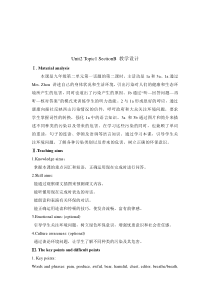 DOC
DOC
【文档说明】Unit 2 Topic 1《Population has caused too many problems》(SectionB)教学设计-九年级上册英语【仁爱版】.doc,共(12)页,55.000 KB,由小喜鸽上传
转载请保留链接:https://www.ichengzhen.cn/view-104571.html
以下为本文档部分文字说明:
Unit2Topic1SectionB教学设计Ⅰ.Materialanalysis本课是九年级第二单元第一话题的第二课时,主活动是1a和3a。1a通过Mrs.Zhou讲述自己的身体状况和生活环境,引出污染对人们的
健康和生态环境所产生的危害,同时也道出了污染产生的原因。1b通过“听—回答问题—再听—核对答案”的模式来训练学生的听力技能。2与1a形成很好的呼应,通过康康向报社反映西山污染情况的信件,呼吁政府和大众关注环境问题,要求学生掌握词性的转换,强化1a中的语言知识。3a和3b通过图片和简介来描述
不同种类的污染以及带来的危害。在学习这些污染的同时,也兼顾了单词的重读,句子的连读、停顿及语调等语言知识。通过学习本课,引导学生关注环境问题,了解各种污染类别以及带来的危害,树立正确的环保意识。Ⅱ.Teachingaims1.Knowledgeaims:掌握本课的重点词汇和短语,正确运用现在完
成时进行问答。2.Skillaims:能通过观察课文插图来预测课文内容。能听懂用现在完成时表达的对话。能朗读和表演有关环保的对话。能正确运用连读和停顿的技巧,使发音流畅,富有韵律感。3.Emotionalaims:(optio
nal)引导学生关注环境问题,树立绿色环保意识,增强忧患意识和社会责任感。4.Cultureawareness:(optional)通过谈论环境问题,让学生了解不同种类的污染及其危害。Ⅲ.Thekeypointsanddifficultpoints1.Keypoints:Wordsan
dphrases:pain,produce,awful,bear,harmful,chest,editor,breathe/breath,soilgetapainin…,what’sworse,toom
uchnoise,toomanyproblems,breathingproblem,beharmfulto,makeamessof,throw…aroundSentences:It’sdifficultformetobreathe.I’vegotapainin
mythroat.It’sreallyawful.A:Howlonghaveyoubeenlikethis?A:Haveyouseenadoctor?B:I’vebeenlikethissincelastweek.B:Not
yet.Grammar:PresentPerfect的问答。2.Difficultpoints:能在不同语境中,正确判断单词的不同词性。在朗读中,能正确地把握连读和停顿的技巧。Ⅳ.Learningstrateg
ies通过1a,教会学生善于利用插图理解有关污染的对话。通过2,训练学生在不同的语境中学会转换词性,并拓展学生的词汇量。通过3a,引导学生通过观察图片分析和了解不同的信息。通过3b,要求学生掌握连读,停顿的发音技巧,反思自己的发音中的问题。Ⅴ.Teachingaids
单词卡片(如:breathe/breath,pain,harmful/harm);关于污染的图片或者幻灯片;录音机;小礼品若干等。Ⅵ.TeachingproceduresStage(timeperiod)InteractionpatternsTeacher
activityStudentactivityRemarks1Gettingstudentsreadyforlearning(2mins)GroupworkGuidetheSstodiscussdifferentkindsofpollutioningroupsan
dsharetheanswertogether.T:HowmanykindsofDiscussdifferentkindsofpollutioningroupsandsharetheanswertogether.该环节是对前
一课时所布置作业的检查,让学生通过查找资料,倾听同伴的讲解等方式,提高获取信息的能力pollutiondoyouknow?S1:AirpollutionS2:WaterpollutionS3:LitterS4...S1:AirpollutionS2:
WaterpollutionS3:LitterS4...和意识,引导学生从不同渠道关注社会问题。2Lead-in(5mins)ClassactivityLettheSslookatthepicturesin3aonpage30andguessthemeaningandpronunciationo
f“soil”.Askthemtopayattentiontothetypesofpollution.T:Lookatthesepictures,whatkindsofpollutionarethese?S1:AirpollutionS2:WaterpollutionS3:Litte
rS4:LightpollutionS5:NoisepollutionGuessthemeaningandpronunciationofthenewwordsaccordingtothepicturesandtheteacher’sdescriptions.S1:A
irpollutionS2:WaterpollutionS3:LitterS4:LightpollutionS5:Noisepollution先让学生根据图片猜测短语的意思,此处只呈现前五幅图片,在下一环节再用“soi
lpollution”引入听前活动,并以此教授部分新的单词和短语。3Pre-listening(5-7mins)ClassactivityShowthepictureofsoilpollution,teachthenewwordsandchecktheanswersof3b.Payattentio
ntothepronunciation,liaisonandpausewhilereading.Lookatthepictureofsoilpollution,learnthenewwordsandtrytofinish3b.Payattentiontothepronunciation,li
aisonandpause教师应利用介绍土壤污染的契机,教授新单词、短语,同时示范句子的连读和停顿,为训练学生流畅的口语打好基础。T:Lookatthispicture,whatkindofpollutionisthisone?(LeadtheSs
topronounceit.)S6:Soilpollution.T:Right.Peopleusetoomanychemicalsintheirfields,/andsoilpollutioncausesunhea
lthyfood.Thefoodisharmfultoourhealth.(TeacherwritedownthewordsandphrasesontheBb.)T:Nowtrytofillintheblanksin3
bwiththewordsandphrasesin3a.…T:Nowlet’schecktheanswer.S1:waterpollutionS2:airpollutionS3:noisepollutionS4…T:OK,let’sre
adthesentencestogether.Paywhilereading.S6:Soilpollution.S1:waterpollutionS2:airpollutionS3:noisepollutio
nS4…attentiontothepronunciation,liaisonandpause.(Teachercangiveanexampleifnecessary)…4While-listening(5-7mins)IndividualworkStep1:Showapictureofthep
ollutedWestHill,lettheSslistento1aonceandtickthequestionstheyhearinpartAof1b.Thenchecktheanswerstogether.T:Asweknow,theWest
Hillhaschangedalot.Lookatthispicture,whatpollutioncanyoufindinthepicture?Ss:Airpollution,waterpollut
ion,noisepollution…T:Right.Whateverthepollutionis,itisharmfultopeople’shealth.Mrs.Zhougetsapaininherchestbecauseofthebadair.Nowlistentothedialo
gLookatapictureofthepollutedWestHill,listento1aonceandtickthequestionstheyhearinAof1b.Thenchecktheansw
erstogether.Ss:Airpollution,waterpollution,noisepollution…S1:What’swrongwithyou?S2:Howlonghaveyoubeenlikethis?S3:Haveyouseen在环节与环节的过度上,要注意自然流
畅,是顺理成章的进入下一个步骤,而不是直接切入。因为过渡语既能起到承上启下的作用,又能抓住学生的注意力。IndividualworkbetweenKangkangandMrs.ZhouandtickthequestionsyouheartofinishpartAin1b.…T:OK
,let’schecktheanswers.S1:What’swrongwithyou?S2:Howlonghaveyoubeenlikethis?S3:Haveyouseenadoctor?S4:Haveyoun
oticedthedeadfishintheriver?Step2:GettheSstolistenagainandmatchthequestionswiththerightanswersinpartBof1b.Thenchecktheanswers
together.T:Great.Listenagain,matchthequestionswiththerightanswersinB.…S5:No.1isc.adoctor?S4:Haveyounoticedthedeadfishintheriver?Li
stenagainandmatchthequestionswiththerightanswersinBof1b.Thenchecktheanswerstogether.…S5:No.1isc.S6:No.
2isb.S7:No.3isa.S8:No.4isd.S6:No.2isb.S7:No.3isa.S8:No.4isd.5Post-listening(17mins)IndividualworkClassactivityandGroupworkStep1:GettheSstoread1aanda
nswerthequestionsin1c.T:Nowread1abyyourselvesandanswerthequestionsin1c.….T:OK,whatcausedMrs.Zhou’sproblem?S1:Pollution.Thec
hemicalfactoriesproduceterriblegas,maketoomuchnoiseandpourwastewaterintorivers.T:WhatwillKangkangdo?S2:Hewillwritetoth
enewspaperabouttheproblems.T:Doyouhaveanyotherwaystosolvetheproblem?S3…Read1aandanswerthequestionsin1c.…S1:Poll
ution.Thechemicalfactoriesproduceterriblegas,maketoomuchnoiseandpourwastewaterintorivers.…S2:Hewillwritetothenewspa
perabouttheproblems.…S3…Read1a,findthedifficultpoints,andtrytosolvethem通过完成1c的读后任务,进一步理解对话内容。在完成该任务时,如果答案不能直接从课文中找出,要引导学生学会用自己的语言总结和归纳答案,允许有不
同的表达方式。以1c的第一题为例(WhatcausedMrs.Zhou’sproblem?)简单的回答就是pollution。如果要答案具体化,就必须先引导学生找出周夫人的问题,再找出原因,最后用自己的话归纳
出答案(Thechemicalfactoriesproduceterriblegas,maketoomuchnoiseandpourwastewaterGroupworkIndividualworkStep2:LettheSsread1a
carefullyandunderlinethedifficultpointsincludingwords,phrasesandsentences.ThenleadtheSstoasktheirclassmate
sandteacherforhelp.Writedownthepointstheycan’tunderstandontheBb.T:First,read1aandunderlinethedifficultpoints…T:Iftherearesomedifficultpointsyouc
an’tunderstand,pleaseaskyourclassmatesforhelp.Ifallthegroupmemberscan’tsolvetheproblem,Icangiveyousomeadvice.Ss:Howtouse“getapainin…
”?T:Wecanalsosaylikethis“Ihaveasorethroat”.withthehelpofallkindsofresources.…Ss:Howtouse“getapainin…”?…
Ss:Yes.…Ss:Itmeans“某处疼”inChinese.Ss...Read1ainroles,andthenactoutthedialog.Payattentiontotheintorivers)。学生能够正确提出问题,也是能力的体
现。教师需要引导学生,一步一步朝着正确答案去思考,可以运用课文中的文本语言,也可以拓展例句提供新的语境,还可以根据已学知识理解新知识(以短语“getapainin…”为例,pain是本课新单词,要理解短语的意思和掌
握短语的用法就会比较难,因此,教师可以通过“Ihaveasorethroat”帮助学生理解意思。用举例“Igetapaininmyleg”同时捂住左腿,帮助学生观察该短语的用法)。Canyouunderstanditsmeaning
?Ss:Yes.(Teachertouchesoneofhislegsandsays.)T:Igetapaininmyleg.“Getapainin”canbeadded“apartofabody”aftertheproposition.T:What’s
theChinesemeaningofit?Ss:Itmeans“某处疼”inChinese.Ss...Step3:LettheSsread1ainroles,andthenactoutthedialogandpa
yattentiontothepronunciationandintonation.T:Nowread1ainroles,andthenactoutthedialog.Payattentiontothepronunciationandintonation.
Afterthat,wewillhaveapronunciationandintonation.Therewillbeperformancecompetitionamongthegroups.Thebestonewi
nstheaward.Scanthematerialandchoosethecorrectwordstocompletetheletterin2.Ss:Yes……S1:toomanyS2:breatheS3:dead…课文朗
读是培养学生的语感,训练语音语调的方法之一。为了让学生目标性更强,更加严格的要求自己正确发音,学会合作,教师采用(以六人组为例)组内三人扮演一个角色,进行对话;并采用一些竞争机制,激发学生的斗志和参与课堂活动的热情,维护小组的集体
荣誉感。在角色扮演前,教师选择率先做好准备的小组,让他们选择任一小组进行挑战,胜利者将得到老师的礼物(或competitiontoseewhichgroupperformsbest.Thebestonewinstheaward.Step4:Leadthe
Sstoscanthematerialandchoosethecorrectwordstocompletetheletterin2.T:Kangkanghaswrittenalettertothenewspaperaboutpol
lution,butsomewordsaremissing.Canyouhelphimfinishtheletterwiththegivenwords?Ss:Yes…T:Nowlet’schecktheanswerstogether.S1:toomanyS2:
breatheS3:deadT:Great.You’dbetterpaymoreattentiontothedifferencebetween“toomany”and“toomuch”.Usetheright者积分),落后组再选一组,循环挑战;
也可以另外选择两组进行两两PK。formsofthewordsaccordingtodifferentcontent.6Summarizingandassigninghomework(5mins)ClassactivityStep1:LettheSsgooverwh
attheyhavelearnedthisperiod.Sumupthekeypoints.T:Nowlet’ssumupwhatwehavelearnedtoday.Youcanbeginwiththewordsandthephrases.Step2:HMK:Let
theSstochooseonetypeofpollutionandcollectsomeinformationaboutitaccordingtothequestionsin3onpage32.1.W
hatis…pollution?2.Whatmakesthe…pollution?3.Whatproblemsdoesitcause?4.Whatcanbedonetosolvetheseproblems?Sumupandpresentth
ekeypointsonebyone.S1:getapainin…S2:beharmfulto…S3…Chooseonetypeofpollutionandcollectsomeinformationaboutitaccordi
ngtothequestionsin3onpage32.在总结本科所学时,明确复习的内容和方向,让学生在罗列知识时更有系统性,养成在头脑中建构知识框架的习惯。作业的布置是为学习SectionC打好基础,提供素材。Ⅶ.B
lackboarddesignPollutionhascausedtoomanyproblems.SectionBWords:pain,produce,awful,bear,harmful,chest,breathe/bre
ath,Soil,editorPhrases:getapainin…,what’sworse,toomuchnoise,toomanyproblems,breathingproblem,beharmfulto
,makeamessof,throw…aroundSentences:It’sdifficultformetobreathe.I’vegotapaininmythroat.It’sreallyawful.A:Howlonghaveyoubeenl
ikethis?B:I’vebeenlikethissincelastweek.A:Haveyouseenadoctor?B:Notyet.
 辽公网安备 21102102000191号
辽公网安备 21102102000191号
 营业执照
营业执照